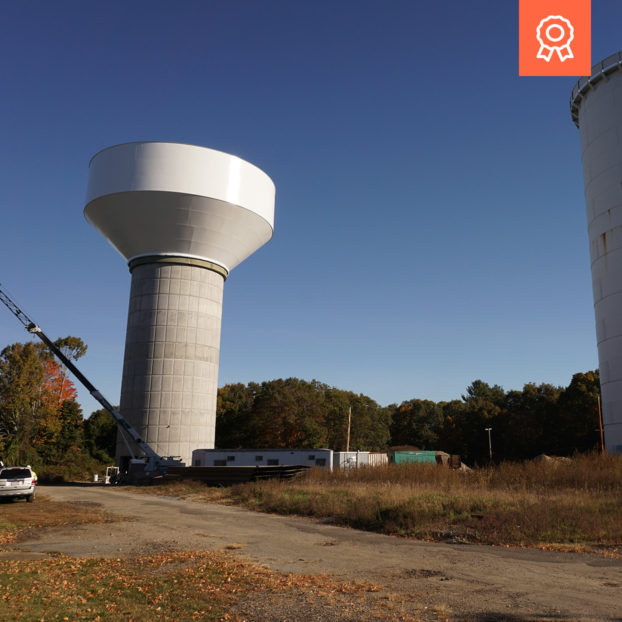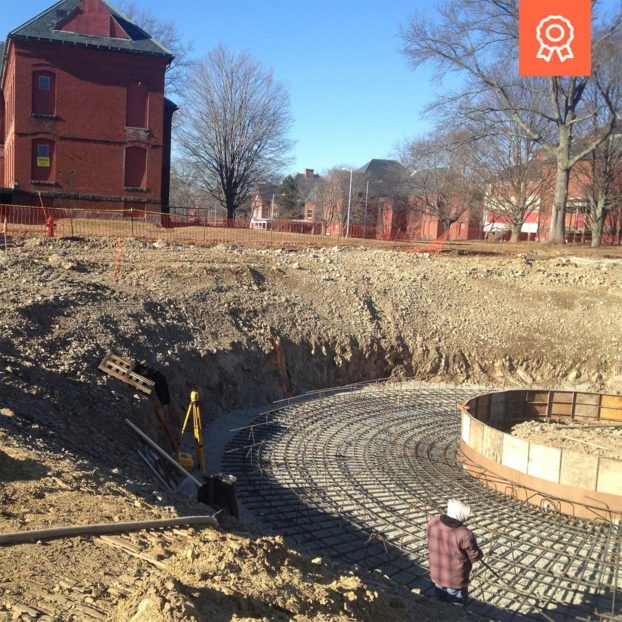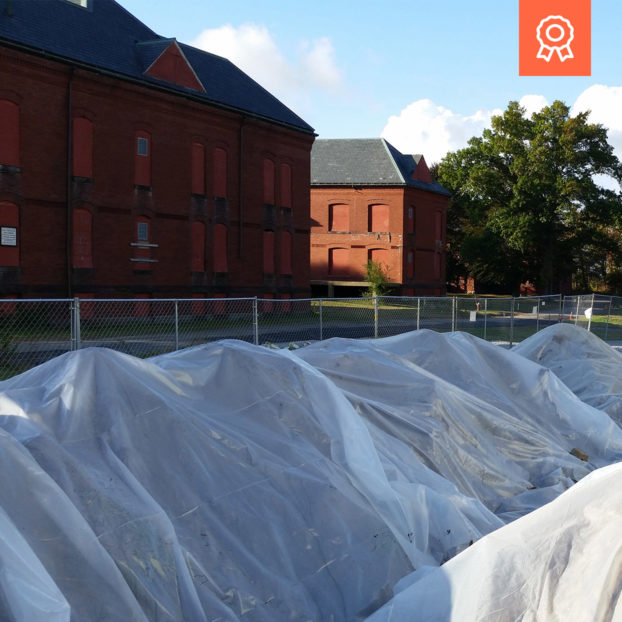Transferred to the Town of Medfield in the mid-1990’s, the Medfield State Hospital Campus, consisting of a 90 acre parcel of land, over 50 buildings, and its own water system and storage tank, provided the Town with the hope of expanding its water system, and many challenges to accomplish this goal. The existing water storage tank, an 80-year old standpipe tank, was inefficient based on its shape, geometry, and overflow elevation and was located on a site with contaminated soils. In 2013, Environmental Partners (EP) began work for the Town to examine options to provide safe water and an efficient system.
Initial work examined different tank sizes and configurations, cost estimates for the recommended improvements, and soil screening for contaminants, providing the Town with multiple project approach options at different scales, costs, construction times, and outcomes. The selected project approach option recommended replacing the inefficient standpipe with a composite, elevated tank, demolition and disposal of the old water tank, soil management, and constructing approximately 2 miles of interconnecting water mains paired with careful sequencing of the work to minimize impacts to the existing system. EP provided design, bidding assistance, construction observation, and administration services for both the Hospital Road Water Main and the New Hospital Road Water Storage Tank. Construction administration included submittal reviews, pay requisition review, preparation of project record drawings and startup, and commissioning services.
Prior to demolition of the existing 80 year old tank, EP evaluated soils around the tank for potential contaminants, and elevated lead concentrations were detected. A detailed field evaluation of the horizontal and vertical extent of lead contaminated soil was performed using a field XRF analyzer and limited laboratory confirmation testing. Based on this detailed evaluation, EP managed the excavation and disposal of lead contaminated soils. Ambient air monitoring for particulates was performed during all excavation to protect workers and nearby residents. Approximately 778 tons of low level lead contaminated soils were excavated and transported to an in-state landfill for disposal, and 313 tons of high lead contaminated soil were treated onsite prior to transportation to a lined out-of-state landfill.
The composite, elevated tank constructed was an efficient hydraulic solution and provided much needed useable storage compared to the existing standpipe. Composite materials (i.e. concrete pedestal/shaft and a metal upper reservoir) were more cost effective than an all-metal tank when compared using a life-cycle cost approach, saving the Town funds on this extensive $5.5 million project.
Located on the property of the former Hospital, a large site of historical significance, the Hospital Road Water Main project and the New Hospital Road Water Storage Tank are controlled and owned by the Massachusetts Department of Capital Asset Management.
The watermain improvements were broken out in a separate design and construction package. New 16” and 12” piping was designed to connect the tank to the existing distribution system, and the under-sized existing pipe on Hospital Road was replaced. The watermains to and from the tank were looped and connected through two alignments to the existing system, providing additional reliability, improving efficiency of water distribution, and reducing pumping costs.
One complex feature that EP overcame involved permitting and pipe installation under an active CSX railroad, which required a substantial permit submission of a 42” casing to protect the 12” carrier pipe from railroad loads. Actual construction work under the tracks was restricted to and completed with continuous work over a weekend from 7 p.m. on Friday through 9 a.m. on Sunday morning. Additional permits were needed from the Conservation Commission due to proximity to wetlands, and close coordination with town management and Massachusetts Division of Capital Asset Management and Maintenance (DCAMM) was necessary.
Construction was completed in 2016, and the new Hospital Road water storage tank now provides over 600,000 gallons of useable storage to the Town and will serve the town for an estimated life of 75 years, with minimized long term maintenance costs consisting of painting the top section of the tank every 20 years.






